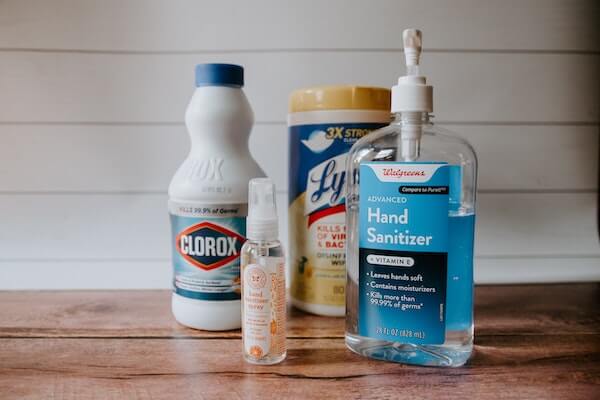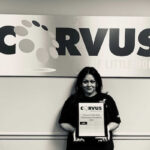While we know that the coronavirus is most frequently passed from person to person, we also know that the virus can live on surfaces for up to a few days. With that in mind, keeping up on cleaning and sanitizing can lower the chance that we get sick or that we get someone else sick. But where do we start? Corvus Janitorial Systems is here to provide answers. Here’s everything you need to know about disinfecting your home from best practices to homemade disinfectant remedies:
Wash Your Hands and Be Extra Careful About What You Touch
We get it, we’re all starting to sound like broken records already, but this really can’t be stressed enough. The most common transmission is person-to-person, so the best way to stop the spread is for all of us to be extra cautious and hygienic. When you cough or sneeze, aim for your shoulder or the crook of your elbow instead of out into open air or in your palm. If your hand is your only option, wash with soap and water for at least 20 seconds after.
Wash your hands after you use the restroom, avoid touching your face, and keep a distance of at least six feet from others when you’re out in public. If you’re out and you can’t wash your hands after touching something, use hand sanitizer for now. The CDC recommends alcohol-based hand sanitizers with more than 60% ethanol or 70% isopropanol.
Clean and Disinfect, Even if No One at Home is Sick
The words cleaning and disinfecting are often used interchangeably, but they do have different meanings. When you clean, you’re often just removing the contaminants (like dust and dirt and crumbs) from the surface. This is what we all often focus on during normal circumstances, but disinfecting is the part that kills the pathogens, so it’s even more important right now.
Use approved disinfectant sprays, wipes, or solutions you’ve concocted at home to disinfect after you’ve wiped everything down with soapy water or a general cleaning spray. If you or anyone else you live with is still coming and going or has had any contact with outside individuals, it’s important to clean and disinfect at least once per day. And don’t forget to wipe your phone and laptop with a disinfectant wipe, too.
Pay Extra Attention to Shared High-Touch Surfaces
By now you know that the coronavirus can live on various surfaces. New research has revealed that it can survive on cardboard for one day and plastic, metal, and stainless steel for up to three. To keep your home’s surfaces safe and virus-free, clean and disinfect things that everyone touches. In the kitchen, high-touch surfaces would be doorknobs (clean and disinfect the ones in other rooms, too), the counter, the faucet, and the refrigerator handle.
High-touch surfaces in other rooms might include tables, desks, dining room chairs, the counter in the bathroom, all other faucets, toilet components, remotes, and light switches. This list might look slightly different for everyone. Use your best judgment to identify high-touch surfaces in your home and then clean and disinfect it accordingly. If you’re moving in and out of the house regularly, you may want to increase how often you wash your clothes.
Use the Right Disinfectants
The Environmental Protection Agency has come out with a full list of disinfectants that are known to effectively kill coronavirus germs. Most will come with information on the label that tells you what it works for and COVID-19 is often included but in a slightly less direct away. Generally speaking, if a product says that it effectively kills influenza, SARS, or RSB, it should work for the novel coronavirus, too.
Clorox, Lysol, and Purell are a few of the more common names on the list, but many store name brands are also approved. Once you’ve picked your product, follow the instructions on the label to get the best results. No disinfectant work immediately. Each requires being left on the surface for a certain amount of time (dwell time) before they’re wiped away.
Make Your Own Disinfectants
The only problem with traditional disinfectant products is that they may be hard to come by right now. If you don’t have any at home, you can’t wait weeks for an online order. Your local store is likely out. You need to disinfect your home now; homemade remedies can help. The CDC recently released a simple and handy diluted bleach solution recipe for all of us to take advantage of.
All you need is four teaspoons of household bleach and one quart of water. Pour these ingredients into a bottle, shake, and spray. Leave the solution to work for 10 minutes before wiping away with a wet cloth. When you’re working with bleach, it’s important to remember to wear gloves, be cautious with materials that may be damaged, never mix it with other chemicals, and take advantage of ventilation. Isopropyl alcohol and hydrogen peroxide are two other common household disinfectants.
How Disinfectants Work
Before the coronavirus outbreak, many of us just knew that we had disinfectants on hand whenever we needed them. They sat under the sink or in a closet or cabinet and they’ve never been valued as much as they are right now. But most of us still don’t know the science behind common disinfectants or how they kill germs. We just know that they do.
Disinfectants are chemical agents that can either inhibit microbial activities and growth or are lethal to microorganisms. Disinfectants work to kill germs and viruses by destroying the cell wall of microbes or interfering with their metabolism.
In man’s struggle to control the microbes responsible for disease and illness many organic and inorganic chemicals have been found to be toxic to microorganisms. In case you’re wondering, here are some of the active ingredients in disinfectants and how they work:
Alcohol – causes cell proteins to glob together, which disrupts and collapses their structure (denaturation)
Chlorine – targets certain metabolic enzymes in the bacterial cell and destroys them
Peroxygen – collapses bacterial cell components like the membrane
Phenol – disrupts the wall of the bacterial cell, damaging it to the point that it can no longer ward off an attack
Quaternary ammonium compounds – denature the bacterial cell’s proteins and cause a leak of vital substances that leads to death
For more information and resources relating to COVID-19, visit our coronavirus response page here.
This piece is meant simply to inform, not to provide any legal or medical advice.
About Corvus Janitorial Systems
Founded in 2004 to make people’s lives better, Corvus is a full-service commercial cleaning franchisor that offers cleaning services through reputable local Franchisees. Corvus has been guided by its mission to transform people and transform places by consistently delivering independence, security, and freedom to Franchisees who deliver high-quality cleaning to offices, educational buildings, medical buildings/offices, recreational centers, industrial parks, and other spaces. The company has 17 regional support offices across the United States with nearly 900 Franchisees. For more information regarding Corvus, visit corvusjanitorial.com or corvusjanitorial.com/franchise/ for franchise information.













